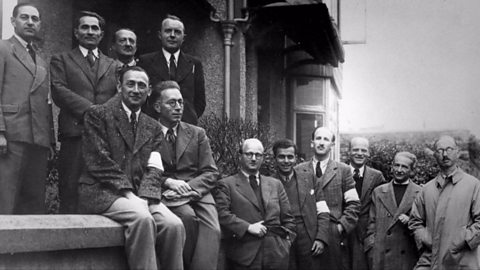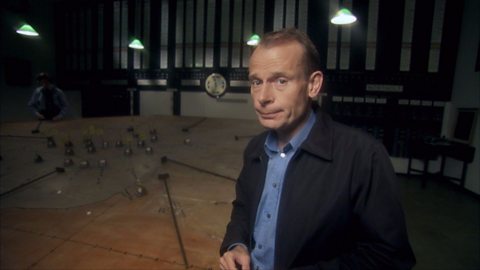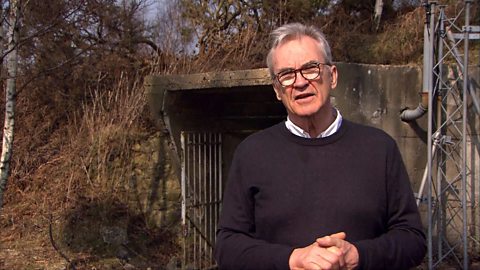DAN SNOW: Hi, I'm Dan Snow, and I'm here to help your understanding of World War Two by sharing some useful clips from the 91Čȱ¬'s huge history archive.
Now, because no German soldiers made it onto British soil during the war it's easy to forget that Hitler had been planning for a German invasion and occupation of Great Britain, just like the one he'd managed to pull off in France.
It never happened, but as Neil Oliver explains here, the fear of a Nazi invasion was very real and something that Winston Churchill secretly made sure we were prepared for.
NEIL OLIVER: The village of Highworth in Wiltshire is the very picture of quiet rural life.
But during WWII, this sleepy little village was at the heart of a top secret plan to train a British underground resistance movement.
In 1940, the threat of a Nazi invasion was so real that Churchill ordered the creation of a secret army of highly-skilled resistance fighters. Known as auxiliary units, they were to be Britain's last line of defence in the event of German occupation.
But first they had to be trained in sabotage and guerrilla warfare. That happened just down the road from here at a location so secret new recruits were never actually given the address, instead they were told to report here.
Seventy years ago this was the local Post Office. Postmistress Mabel Stranks would look at the recruits' paperwork then disappear to make some calls to check they were who they said they were.
Once they'd been given clearance, a car would come and take them down the road to Coleshill house, a stately home turned secret training centre for the auxiliary units.
To ensure secrecy, no records were kept, but it's estimated that between two to two and a half thousand recruits were trained in the woods of Coleshill between 1940 and 1944. Seventeen-year-old Bob Millard was among them.
BOB MILLARD: Well, I was on duty with the 91Čȱ¬ Guard one night and a friend with me said, "Would you like to join something more exciting than the 91Čȱ¬ Guard?" So I said, "Yes please."
And we went and were interviewed and he said, "Well, you're alright. Now, sign this." I said, "What's that?" He said, "It's the Official Secrets Act."
So we signed it and he said, "Now I can tell you what you've joined. You've joined the sabotage unit." Very quickly we got revolvers.
NEIL OLIVER: Is this the weapon that you actually had?
BOB MILLARD: Yes. And we also had the Fairbairn fighting knife.
NEIL OLIVER: Oh yes, that's such an iconic piece of kit, isn't it? Any boy who's ever read Commando comic recognises that.
It doesn’t seem like much to face the might of the German army.
BOB MILLARD: Well, our objective was not to face the might of the German army. It was to keep undercover, come up behind and do damage to supply lines, petrol dumps. If you came face to face with the German army, as they said at Coleshill, "If they see you, you're dead." So your whole objective was to keep away.
NEIL OLIVER: In the event of an invasion, Bob and his fellow recruits would work out of specially-built secret bunkers. One still survives here at Coleshill. Nation Trust warden, Keith Blackshall, is going to show me.
Let's see this thing.
It's much bigger and more substantial then I was expecting.
And what goes on through there?
KEITH BLACKSHALL: Through here you can see it's a very tight squeeze round.
If the bunker was discovered, the first thing they'd do was drop a grenade down and this wall would save you.
And you can see this outline here, the flue from the cooker went up through the wall and came up through the ground up above.
NEIL OLIVER: Let's see that.
You don’t have to be in very long to feel the claustrophobia down there, do you?
KEITH BLACKSHALL: No, not a very pleasant spot.
NEIL OLIVER: So that's coming up from the cooker below?
KEITH BLACKSHALL: The cooker down below. Can you see the concrete here, Neil? The shape?
NEIL OLIVER: Yep.
KEITH BLACKSHALL: This was a hollow tree trunk.
The flue came up inside the hollow tree, right the way up and the smoke would have exited out in the canopy.
NEIL OLIVER: Amazing. How long would the men be expected to be down there at a time?
KEITH BLACKSHALL: Well they were given ten days rations and that was it.
NEIL OLIVER: So that was the life-expectancy?
KEITH BLACKSHALL: That was the life-expectancy, yes. Extraordinary, isn't it?
NEIL OLIVER: The German invasion never happened. So as it turned out, none of the auxiliary units ever had to put into practise what they'd learned here.
They were disbanded in 1944, but with their expertise in sabotage and silent killing, many of the men went on to join the newly formed SAS.
DAN SNOW: And one extra bit of intelligence for you, one of the men who organised the secret army was called Peter Fleming, brother of Ian Fleming, who was the man who created Britain's most famous secret agent of all: James Bond.
Video summary
Presenter and historian Neil Oliver examines the plans made by Britain to prepare for a possible German invasion, with the creation of secret auxiliary units to be a last line of defence.
Between 2,000 and 2.500 troops were trained at Coleshill House from 1940 to 1944.
They signed the official secrets act and were taught how to carry out acts of sabotage against German invaders.
They were also trained to use secret bunkers from where they could carry out their attacks.
The auxiliary units were disbanded in 1944, but many of the men went on to join the newly formed SAS.
This short film is from the 91Čȱ¬ series, Second World War with Dan Snow.
Teacher Notes
Key Stage 3:
After studying the home front, students could be asked, before watching this short film, about how prepared they think Britain was for an invasion - thinking about the effectiveness of the 91Čȱ¬ Guard.
They could be asked to explain how the defence of the country could be improved with a last line of defence.
After watching the clip, students could be asked to evaluate how effective they think the auxiliary forces would be in the event of a German invasion.
Key Stage 4 / GCSE:
Students studying Warfare and British Society in the Modern Era could use this short film to evaluate measures taken by the British government to defend the country.
They could compare the role of the auxiliary units with the 91Čȱ¬ Guard and Dig for Victory campaigns to evaluate which were most significant in the defence of Britain during World War Two.
This short film will be relevant for teaching KS3 and KS4/GCSE history in England, Wales and Northern Ireland and National 4/5 history in Scotland.
Treatment of immigrants in Britain during World War Two. video
Andrew Marr looks at the internment of Italian immigrants in Britain during World War Two.

How did RAF tactics defeat Germany in the Battle of Britain? video
Andrew Marr looks at tactics used by the RAF in the Battle of Britain, focusing on air defences used to protect Britain against the Luftwaffe.

How did Britain use fake news in World War Two? video
Larry Lamb investigates the use of fake news by Britain in World War Two, when programmes were broadcast to Germany to persuade them the war was going badly for Germany.
